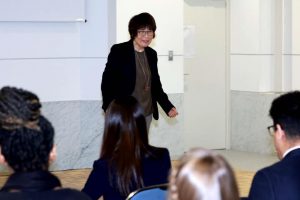My life—Interview with Keiko Ogura (1937–), interpreter and A-bomb survivor, Part 12: Communicating experiences in atomic bombing with others
May 16, 2023
Opening up about personal “pain” from bombing
As an interpreter-guide for international visitors to Hiroshima, I kept my own experience in the atomic bombing locked away for a long time, only mentioning it briefly overseas in the 1980s. I began to share my story in front of large audiences only later, around 60 years after the bombing.
When I introduce A-bomb survivors to people from overseas and interpret for them, I come to learn of their horrific experiences. Some of the survivors suffered severe injuries, mental and physical illness, or were forced to cremate the bodies of their parents after they had been killed in the bombing. Some became orphans and had to grow old all alone. Interpreting for A-bomb survivors next to me and sensing them trembling with emotion, I would have to stifle tears. Rather than sharing my own experiences as a young girl who did not suffer severe injuries in the bombing, I have always felt my job in my interpretation work was to communicate the stories of people who suffered more than I did.
Some journalists from overseas media only wanted to see the visible scars of survivors such as keloids, but I have worked hard to convey the terror felt by the survivors of the atomic bombing, which also caused deep psychological wounds. At the same time, I considered it somewhat sinful for me to have others share their painful memories while hiding my own.
One time, a group of American high school students asked me to share what I had seen with my own eyes instead of interpreting the stories of others. When I began to speak and share my story in English, the young people listened attentively with a serious look on their faces. That experience opened my eyes. With that, I took one step further to communicating about my own experiences in the atomic bombing to overseas children, the very people who will lead nuclear nations in the future.
In 2011, Ms. Ogura was assigned by the Hiroshima Peace Culture Foundation to serve as an A-bomb survivor who speaks of her experiences in the atomic bombing in English.
Speaking about the horrific conditions I witnessed when I was eight years old encourages people to listen to me more empathetically because I was so young. I began to think that being a child at that time might provide me the opportunity to effectively convey the “pain” I felt.
Since 2020, activities to explain experiences in the atomic bombing have changed greatly due to the coronavirus pandemic. While it has become difficult for people to travel to and from Japan, there are now more opportunities to share our stories online. The best way to connect with audiences is in person, but I am still active online as a way to convey my story to many more people throughout the world.
Time waits for no one. In recent years, survivors to whom I have provided interpretation are dying one by one. I am not certain myself how much longer I will be able to continue my activities. That is why I believe I need to share my story to the extent that I am able.
(Originally published on May 16, 2023)








